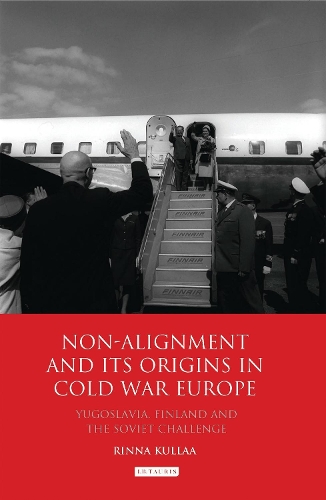
Non-alignment and Its Origins in Cold War Europe: Yugoslavia, Finland and the Soviet Challenge
(Hardback)
Publishing Details
Non-alignment and Its Origins in Cold War Europe: Yugoslavia, Finland and the Soviet Challenge
By (Author) Rinna Kullaa
Bloomsbury Publishing PLC
I.B. Tauris
13th March 2012
United Kingdom
Classifications
Tertiary Education
Non Fiction
European history
940.55
Physical Properties
Hardback
240
Width 138mm, Height 216mm
428g
Description
After World War II, Europe stood divided between two clearly defined and competing ideologies and systems of government. Within this context of confrontation and mutual hostility between the United States and the Soviet Union, Rinna Kullaa provides a unique analysis of the attempts of two European states to successfully avoid absorption into the Soviet bloc. This book explores the relations of Yugoslavia and Finland both with the Soviet Union, and with each other, as they strove to preserve and create their independence. Whilst at first attempting the neutralism strategy employed by Finland, in the face of Soviet hostility, Tito's Yugoslavia instead led the way to the founding of the Non-Aligned Movement in 1961. Kullaa's crucial analysis of the formative period of the Cold War will be of vital interest to students and researchers of International Relations, European History, the Cold War and diplomacy.
Reviews
The evolution and development of Finland and Yugoslavia after the Second World War are interesting but neglected phenomena. Both emerged from the Second World War in the shadow of the Soviet Union but both plotted a cautious and ultimately successful path to independence. Their success in doing so was an essential condition for the emergence of the non-aligned movement. This process has been neglected in western scholarship. Rinna Kullaa has made good this deficiency by providing a fascinating and important analysis of how the two states survived and of how their unique form of mutual support enabled them to do so. Richard J. Crampton, Professor Emeritus of East European History, University of Oxford 'Rinna Kullaa's work offers a detailed insight into the history of neutralism as a foreign policy alternative, rendering it accessible to students who may be unfamiliar with it. This book is a good introduction to the study of alternative foreign policies to students and professional readers of international relations, political science, modern history or economics. This worthy treatment seems set to become the standard account of the Non-Aligned Movement. The particular contribution of this piece of creative and well-research history of international relations is its ability to transcend the previously set analytical division of Western and Eastern Europe, the Nordic sphere and the Mediterranean. I am convinced that this book will become essential reading for students to obtain a balanced account of history of diplomatic relations in Cold War Europe.' Milica Uvalic, Professor, Faculty of Political Sciences, University of Perugia, Italy
Author Bio
Rinna Kullaa is Postdoctoral Fellow at the European Studies Institute and the Harriman Institute for Russian, Eurasian and Eastern European at Columbia University. She holds a PhD in European History from the University of Maryland and an MPhil in Russian and Eastern European Studies from the University of Oxford.
